(UroToday.com) The 2023 American Urological Association (AUA) annual meeting held in Chicago, IL between April 28 and May 1st, 2023, was host to an advanced prostate cancer podium session. Dr. Yu Guang Tan presented the results of a real-world analysis of treatment intensification patterns among Asian men with newly diagnosed metastatic prostate cancer.
Early treatment intensification with doublet (addition of docetaxel or androgen receptor signaling inhibitor [ARSI] to ADT) and triplet therapy (darolutamide or abiraterone + docetaxel/ADT) has been advocated for patients with newly diagnosed mHSPC based on survival benefits observed with significant phase III trials.1,2 However, the adoption of treatment intensification has clearly lagged in real-world practice, with most observational studies conducted within the context of a North American healthcare system. Furthermore, there is a paucity of data examining treatment intensification patterns in Asian patients with mHSPC. As such, the objective of this study was to evaluate the real-world prescription patterns and treatment outcomes of men with de novo (i.e., synchronous) mHSPC in a large Asian cohort, as well as factors associated with prescription patterns.
The investigators utilized a prospectively maintained cancer registry from the largest tertiary care, academic medical institution in Singapore (Singapore General Hospital). All patients were diagnosed with de novo mHSPC between 2016 and 2020, the period during which numerous trials of treatment intensification in this disease space were published. The investigators collected demographic and clinicopathologic parameters, prescription patterns, and downstream oncologic outcomes (time to mCRPC, OS).
The cohort baseline characteristics are summarized below. This cohort included 585 patients with a median follow-up of 32 months (range: 19 – 44). The mean age of diagnosis was 73 years. Of patients with available data, the majority were ECOG performance status 0 to 1. 84% of patients had government subsidized plans (the remaining were private paying).
Consistent with North American data, 55% of patients diagnosed between 2016 and 2020 received ADT only, with only 37% receiving any treatment intensification.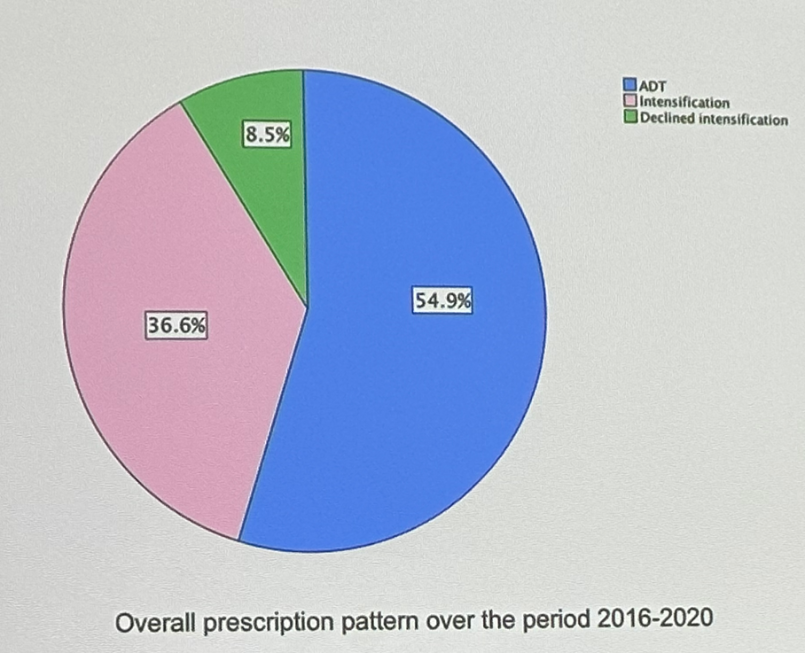
Encouragingly, there appeared to be a temporal increase in the uptake of treatment intensification, and this was mostly due to the increased prescription of novel hormonal agents/ARSIs in this setting (11% in 2016 to 50% in 2020).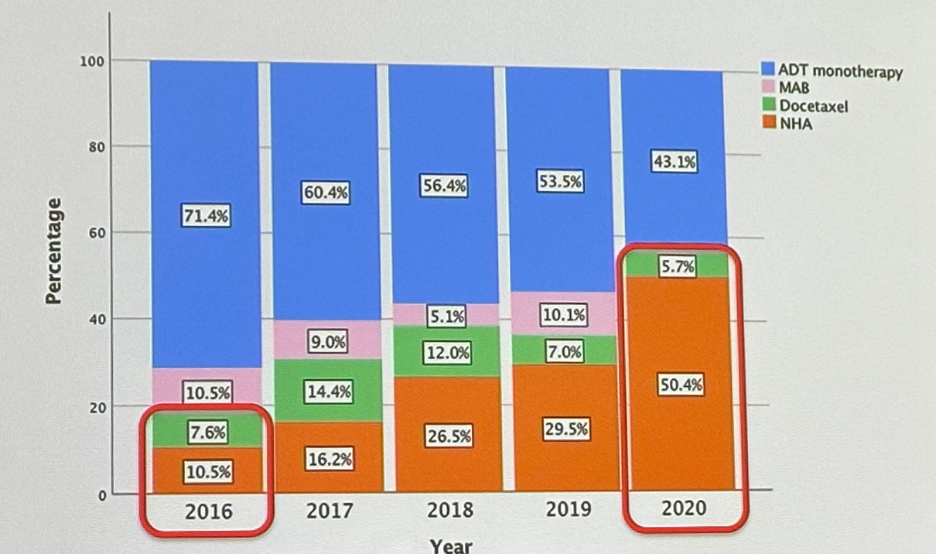
Next, the authors assessed factors associated with the observed prescription patterns and identified the following:
- Lower Charlson Comorbidity Index (CCI)
- Age <65
- PSA >400
Notably, urologic oncologists (OR: 8.7, p<0.0010 and medical oncologists (OR 16.5, p<0.001) had manyfold increased odds, compared to a general urologist, to offer treatment intensification to mHSPC patients, highlighting the importance of appropriate referral patterns in this setting.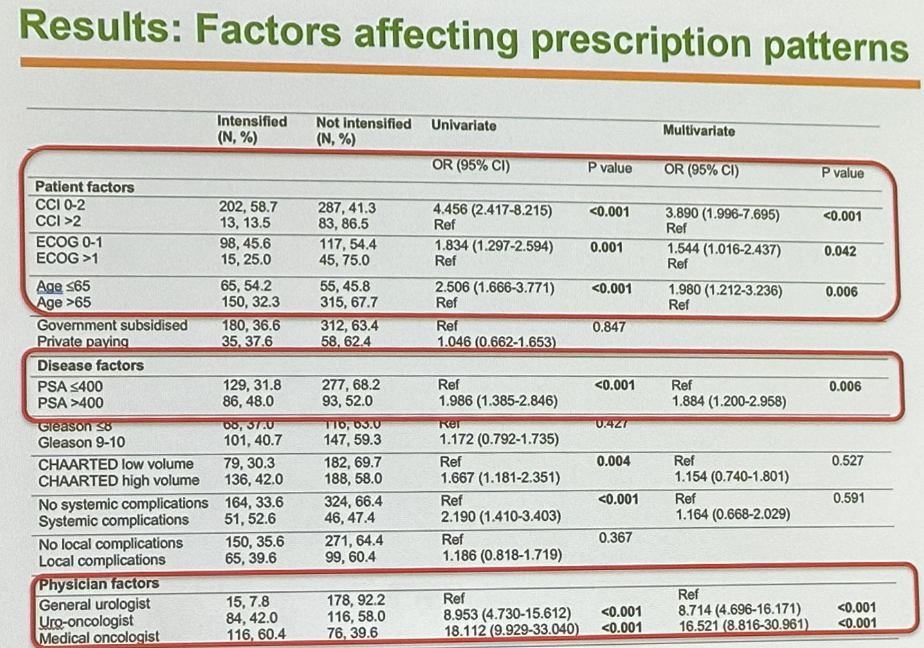
The authors did note that the percentage of mHSPC patients managed by a general urologist has decreased between 2016 and 2020, as demonstrated below: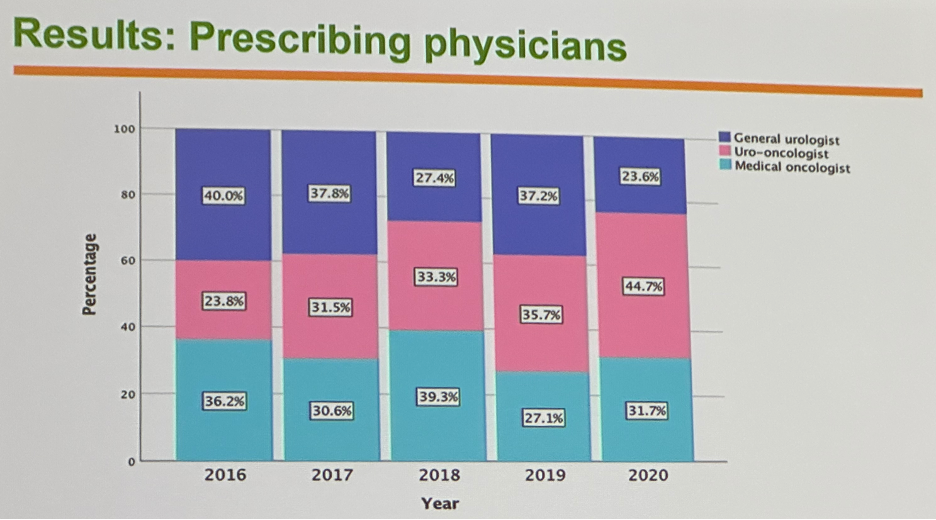
Consistent with the published literature, treatment intensification in this Asian cohort was associated with significant improvement in time to CRPC and OS.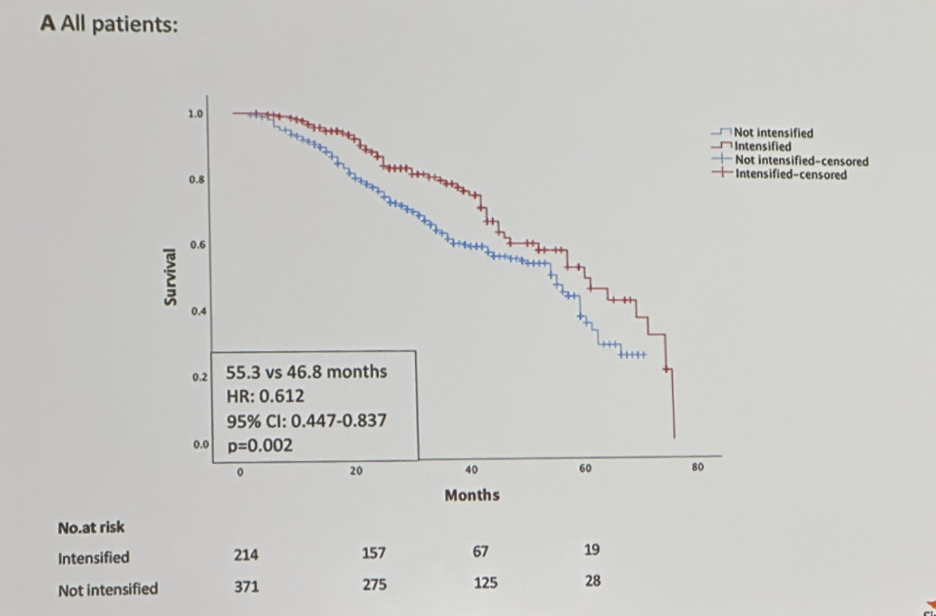
Dr. Yu Guang Tan concluded his presentation as follows:
- The utilization of treatment intensification between 2016 and 2020 at Singapore General Hospital has increased from 18% in 2016 to 56% in 2020
- The overall prescription/utilization of chemotherapy remains stable low at ~15%, with the greatest “driver” of increased treatment intensification being the increased utilization of NHA/ARSIs
- Urologic oncologists have an important role in the management of Asian mHSPC patients with significant disparities in prescription patterns between general urologists and urologic oncologists
- Consistent with the available literature, treatment intensification in this Asian cohort clearly demonstrates time to CRPC and OS benefits
Presented by: Yu Guang Tan, MBBS (Sing) MRCS (Edin) DWD (CAW), Department of Urology, Singapore General Hospital, Singapore
Written by: Rashid K. Sayyid, MD, MSc – Society of Urologic Oncology (SUO) Clinical Fellow at The University of Toronto, @rksayyid on Twitter during the 2023 American Urological Association (AUA) Annual Meeting, Chicago, IL, April 27 – May 1, 2023
References:- Fizazi K, Foulon S, Carles J, Roubaud G, et al. Abiraterone plus prednisone added to androgen deprivation therapy and docetaxel in de novo metastatic castration-sensitive prostate cancer (PEACE-1): A multicentre, open-label, randomized, phase 3 study with a 2 x 2 factorial design. Lancet. 2022 Apr 30;399(10336):1695-1707.
- Smith MR, Hussain M, Saad F, et al. Darolutamide and Survival in Metastatic, Hormone-Sensitive Prostate Cancer. N Engl J Med. 2022 Mar 24;386(12):1132-1142.


